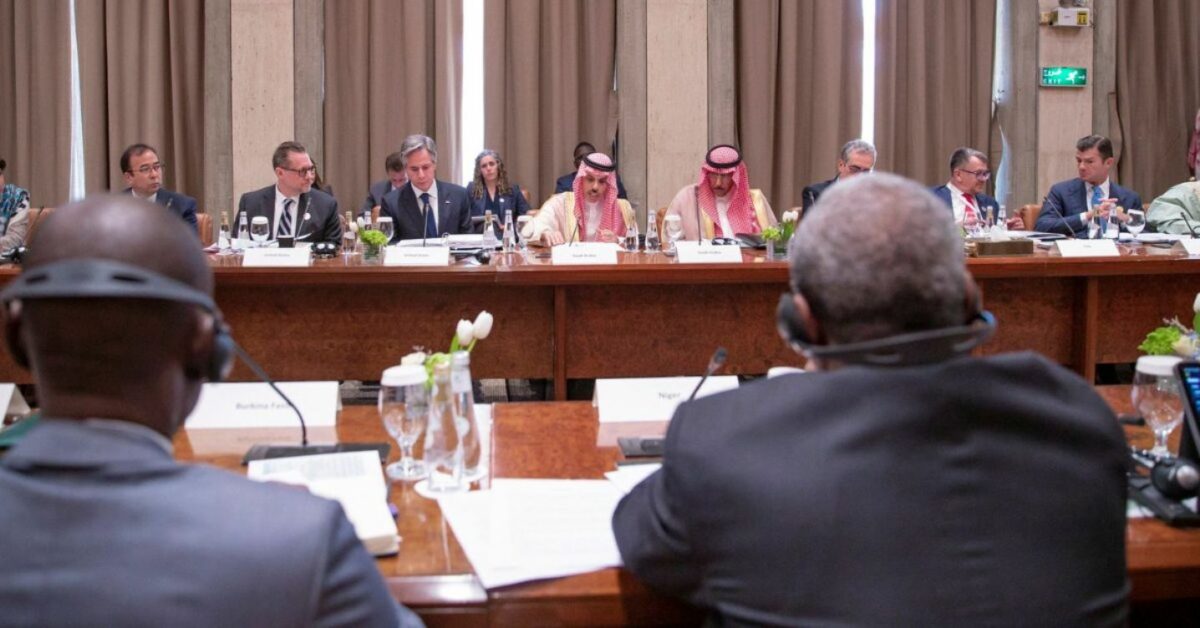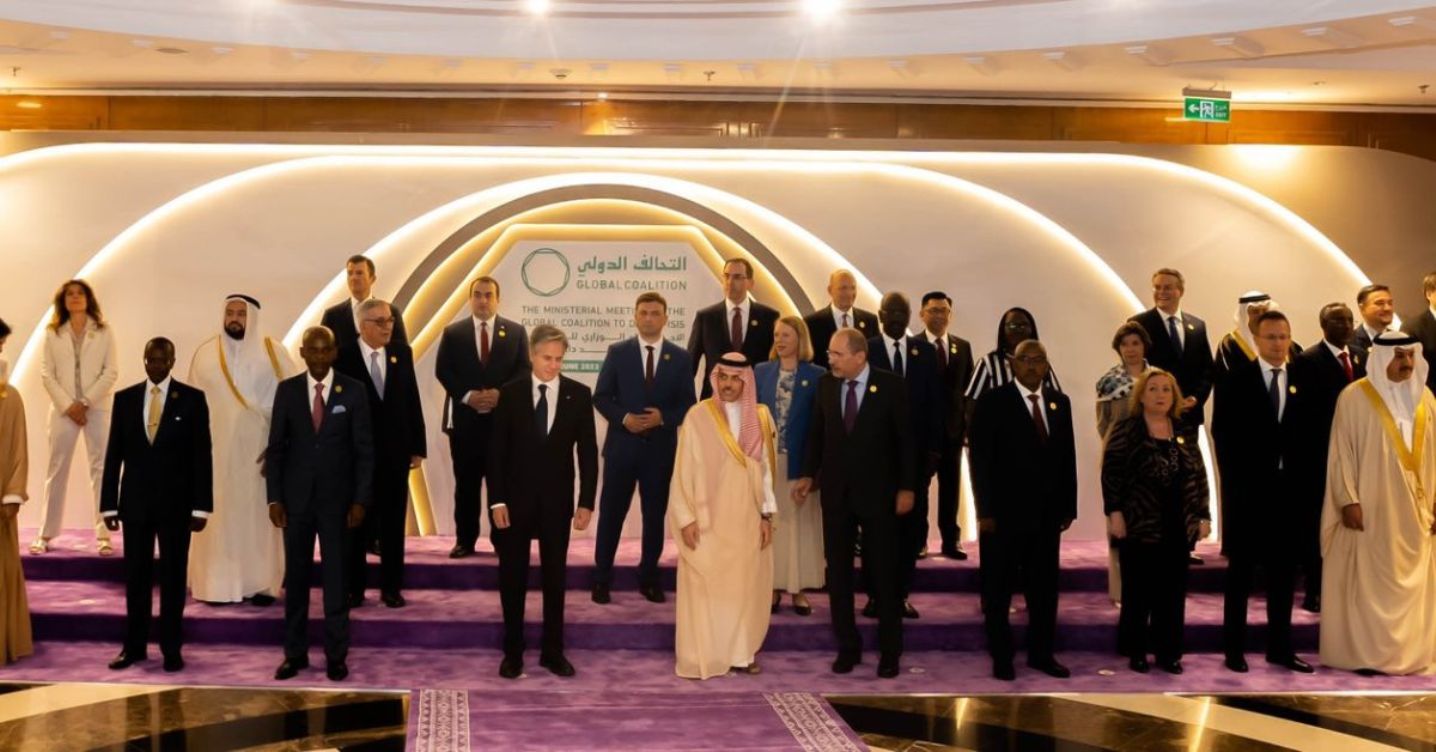RIYADH, SAUDI ARABIA– In a significant ministerial meeting here, US Secretary of State Antony Blinken and Foreign Ministers of the Gulf Cooperation Council (GCC) member states, along with GCC Secretary General Jasem Albudaiwi, reaffirmed their commitment to enhance consultation, coordination, and cooperation across various domains.
The joint statement emphasized the strategic partnerships between the United States and the GCC, focusing on peace, security, stability, integration, and economic prosperity in the Middle East.
Key discussions revolved around important regional issues, including Iran, Yemen, Israeli-Palestinian relations, Syria, Iraq, Sudan, the war in Ukraine, and the ongoing GCC-US strategic partnership. The meeting showcased the shared commitment to building a stronger future through collaborative efforts and common goals.
Also Read US remains invested in Gulf partnerships, Blinken tells diplomats
The ministers highlighted the importance of their countries’ historic ties and celebrated the strategic significance of their relationships. They emphasized the need to build upon the achievements of previous ministerial meetings and the Jeddah Summit to strengthen cooperation in all areas.
The ministers emphasized the importance of their partnerships in promoting peace, security, stability, integration, and economic prosperity in the Middle East. They expressed their commitment to de-escalation efforts and diplomacy, while also highlighting the significance of infrastructure projects for regional integration and interconnectivity.
Navigational rights and freedoms in the region’s waterways were emphasized, as well as the collective efforts to address security threats to vessels. The ministers also addressed the issue of terrorism and violent extremism, expressing their commitment to combating these threats.
They welcomed the upcoming Global Coalition to Defeat ISIS ministerial meeting. Secretary Blinken reaffirmed the United States’ enduring commitment to the region’s security and recognized its vital role in the global economy and international trade.
Iran’s cooperation sought
The ministers reiterated their commitment to freedom of navigation and maritime security, vowing to counter aggressive and illegal actions that could threaten shipping lanes, international trade, and oil installations in the GCC states.
They expressed support for the Treaty on the Non-Proliferation of Nuclear Weapons and called for Iran’s full cooperation with the International Atomic Energy Agency. The ministers welcomed the decision by Saudi Arabia and Iran to resume diplomatic relations and emphasized the importance of adherence to international law, including the UN Charter, by states in the region.

Yemen crisis
Regarding Yemen, the ministers highlighted the importance of the ongoing UN-led peace efforts and expressed their appreciation for the efforts of Saudi Arabia, Oman, and the UN and US envoys. They expressed hope for an inclusive Yemeni-Yemeni political process that would lead to a lasting end to the conflict and address calls for justice, accountability, and redress for human rights violations.
They reaffirmed their support for Yemeni sovereignty, independence, unity, and territorial integrity, and urged the Houthis to seize the opportunity for peace. The ministers emphasized the importance of addressing the humanitarian needs of people across Yemen and providing economic and developmental support. They also reaffirmed their support for UN-led efforts to address the environmental and economic threat posed by the Safer oil tanker.
Israel-Palestinian conflict
On Israeli-Palestinian issues, the ministers reaffirmed their commitment to achieving a just, lasting, and comprehensive peace based on the two-state solution, with borders along the 1967 lines and mutually agreed swaps. They stressed the need to refrain from unilateral measures that undermine the two-state solution and escalate tensions.
The ministers recognized the special role of the Hashemite Kingdom of Jordan in preserving the historic status quo in Jerusalem’s holy sites. They appreciated Egypt’s mediation efforts during recent hostilities between Israel and Gaza. The ministers emphasized the importance of supporting the Palestinian Authority, improving the lives of Palestinians, and providing humanitarian assistance and economic support.
Solution for Syria
Regarding Syria, the ministers reaffirmed their commitment to a political solution that preserves Syria’s unity and sovereignty and meets the aspirations of its people. They welcomed Arab efforts to resolve the crisis in a step-by-step manner, consistent with UN Security Council Resolution 2254. The ministers reiterated their support for US and Coalition forces in their fight against ISIS in Syria, condemning actions that threaten their safety and security.
They called for secure conditions to facilitate the safe return of refugees and internally displaced persons and emphasized the need for support to Syrian refugees and host countries. The ministers called for a nationwide ceasefire and expressed support for the renewal of the Security Council authorization to operate the cross-border mechanism.
Iraq-GCC relations
The ministers noted the positive partnership between the GCC and Iraq, particularly the progress on the GCC Interconnection Authority project, which will link Iraq to the GCC electricity grid. They discussed civilian-led efforts in Iraq, including economic reforms, stabilization, counterterrorism measures, and measures to prevent the financing of terrorism.
The ministers recognized the importance of Iraq’s natural resources and emphasized the need for economic reforms to ensure the Iraqi people benefit from them. They highlighted the significance of stabilization efforts to help communities recover from conflict and violence caused by ISIS. The ministers also discussed the importance of enhancing Iraq’s counterterrorism capabilities and countering ISIS narratives. They expressed their support for a stable, sovereign, and secure Iraq.
Sudan fighting
Expressing grave concern over the recent outbreak of fighting in Sudan, the ministers reiterated their support for diplomatic efforts led by Saudi Arabia and the United States to achieve a short-term ceasefire and enable unhindered humanitarian access. They called for a permanent cessation of hostilities in Sudan and stressed that a military solution would not bring a settlement to the conflict. The ministers urged the Sudanese Armed Forces and the Rapid Support Forces to silence their guns.
Ukraine conflict
Turning their attention to the war in Ukraine, the ministers emphasized the importance of respecting the principle of sovereignty and international law. They called on all countries and the international community to intensify their efforts to achieve a peaceful solution, end the humanitarian crisis, and support those affected by the war. The ministers highlighted the need to facilitate the export of grain and other food supplies and support food security in the affected countries.
Regional security
The ministers reaffirmed their shared determination to contribute to regional security and stability through the GCC-US Strategic Partnership. They commended the outcomes of the working groups on integrated air and missile defense, maritime security and Iran. They also noted the progress made during the Fourth GCC-US Trade and Investment Dialogue meeting.
The ministers highlighted their close cooperation within the Combined Maritime Forces framework and decided to convene a meeting of the GCC-US cyber security working group later this year. They affirmed the importance of continuing periodic working groups on defense issues and expressed their intention to explore working groups on military preparedness and training, as well as the transfer of critical defense capabilities.
The ministerial meeting in Riyadh showcased the commitment of the United States and the GCC member states to strengthen their partnerships and work together towards peace, security, and stability in the Middle East.
The discussions covered a wide range of regional issues, highlighting the shared goals and collaborative efforts to address challenges and promote prosperity in the region. The joint statement issued after the meeting reflected the collective commitment to enhancing consultation, coordination, and cooperation for the benefit of all involved parties.

